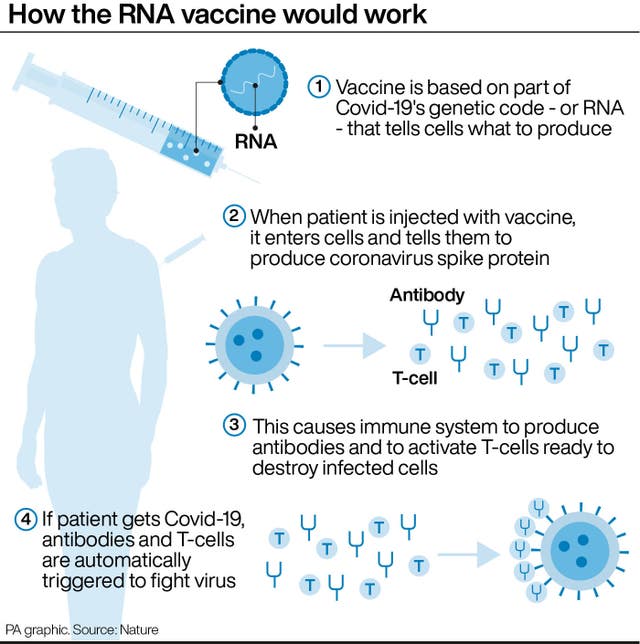Research needed on effectiveness of vaccines in different age groups – experts
The immune systems of older adults often produce a reduced response to vaccination compared with younger people.

More research is needed on the effectiveness of Covid-19 vaccines on different age groups, experts have said.
In a new briefing note published by the British Society for Immunology, scientists have said that research into optimising protocols for any future Covid-19 vaccine which may be given to older people needs to be prioritised.
This is because, they said, the immune systems of older adults often produce a reduced response to vaccination compared with younger people.

Peter Openshaw, professor of experimental medicine at Imperial College London, said: “We need to know whether vaccines are going to work in different age groups.
“We know that flu vaccine has to be tailored according to the age of the subject and that may be the case with Covid-19.”
It comes as Pfizer and its vaccine partner BioNTech announced on Monday that their coronavirus vaccine was more than 90% effective in protecting people from Sars-CoV-2, the virus that causes Covid-19.
Arne Akbar, president of the British Society for Immunology and professor of immunology at University College London, said: “The recent results with the Pfizer vaccine are very exciting but we don’t know at this stage – because the data is not deconvoluted yet – whether it’s effective in both young and old people.”
The authors of the British Society for Immunology note said understanding how age affects the immune system’s response to Covid-19 could be crucial in helping develop more effective treatments and vaccines.”
Prof Openshaw, who was also involved in preparing the briefing note, said that the news on Pfizer’s coronavirus jab “bodes well for the other vaccines which are currently being tested”.
He added that having a vaccine that is 90% effective would be “enough to interrupt transmission”.
He said: “I think it’s possible that some people might even start to be vaccinated this side of Christmas if the vaccine stocks that have been pre-purchased by the UK government are, in fact, available.
“This gives me great hope that we’ll actually be able to get more or less back to normal by by next summer. That’s my expectation having heard this news that this vaccine is 90% effective.”
The note also said while understanding what constitutes “effective immunity” is important for all age groups, special consideration will need to be given to older people.
According to Prof Akbar, this is because “if your immune response changes as you get older, your response to a vaccine will also change”.
The briefing note recommends specific community studies of Covid-19 immunity in older people, which would also include learning from the immune responses of those who did not experience serious symptoms following Covid-19 infection.
There are currently more than 200 coronavirus vaccine candidates being tested around the world, 40 of which are currently undergoing clinical trials.
The briefing note suggests research is needed on how to ensure maximum effectiveness of any these vaccines in older people by investigating dosing schedule, formulation, boosting and vaccination routes.
Different groups of people, by age or by comorbidity, may also require different types of vaccine or vaccine formulations, it said.
Professor Deborah Dunn-Walters, chair of British Society for Immunology’s taskforce on immunology and Covid-19, said: “We need to know how to measure immunity effectively in all age groups in order to assess the efficacy of these vaccines.”





